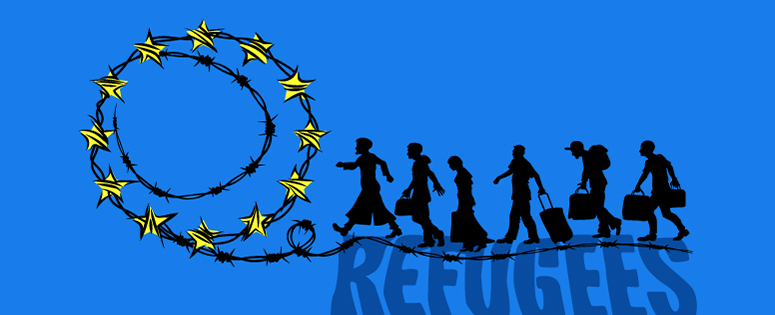A preliminary assessment of the long- term consequences of refugee flows on the European political terrain presupposes, first and foremost, a critical evaluation of the EU’S current conjuncture. What reigns at present in the EU is a neo-capitalist model of political economy. The arbitrary selectivity of economic policies is at the core of this model. It is a model based on a modality that generates unprecedented wealth for the elites and one that transfers burden and strain to the lower and middle social strata. It is rapidly becoming a system of institutional inequality where, if I were to describe it geometrically, the social rhombus is differentiating into a social triangle. In other words, the vital socioeconomic and cultural space of the vast majority of Europeans is shrinking. Consequently and inevitably an ethnocentric mind-set, to say the least, emerges as a mechanism to address the widespread social insecurity. The semi-anarchic manner refugee flows take place, most probably could facilitate further the reinforcement of centrifugal tendencies in the Union. Indeed one might logically argue that Brexit is a living testament of this. Brexit, contrary to the EU’s institutional narrative, poses a severe structural threat to the Union’s political and economic cohesion. And even more so, it weakens the coherence of its collective geostrategic interests. Beyond doubt, the way the EU has been handling the refugee crisis, in which itself is a contributing factor to, is a vivid manifestation of the Union’s prevailing institutional deficits.
The EU’s population currently stands (the UK included) at 508.2 million people. Ceteris paribus, the flow of 2-3 million refugees constitutes a negligible population aggregate if one considers the application of the principle of proportionality in the placement of refugees across the EU. The difficulty in implementing this principle has its roots to the evident uneven economic growth and multi tier socio-cultural development. The migration flows generally are directed towards the most developed member states whose integration structures and welfare services are more competent and efficient in managing the flows. Germany, France, The UK, Italy and Spain represent approximately 63% of the EU’s population. Adding Poland to that, it brings the population percentage to 71%. With the formal completion of Brexit the percentage goes down to 60%. There is a paradox though. The polish flow to the UK surpasses the million and along with a free rider mind-set, the British welfare system has been violently abused. In fact this predicament which was crucial in determining Brexit, it compromises also Europe’s geo-strategic leverage. Furthermore, Poland is adamant not to accept any refugee flow. Instead we witness Greece with a 2.1% of the EU population bearing (along with Italy) the largest burden, not withstanding its severe economic crisis. European neo-capitalism transforms Greece into a soul warehouse. We should not lose sight of the existing 125million poor in the EU, i.e., 25% of its population, let alone the unprecedented pauperization of children. According to the Nobelist economist Angus Deaton, the younger generation (20-35) in Europe, and not only, is steadily marginalized and deprived of a fair share of the produced wealth. This circumstance creates frustration and aggression. It also leads to a sui generis Social Darwinism as a mechanism of managing politically the middle and lower social strata as well as pensioners. This social dynamic will delimit the future prospects of Europe in terms of its capacity to integrate refugees but all the same, to preserve its cultural character.
It seems however, that the ruling elites are hesitant and not willing to risk the internal political stability of an economic edifice that is substantiated and materialized on a greedy redistribution of wealth on the one hand, and the widening of poverty on the other. The refugee flow apart from the further constraining impact it causes on the socioeconomic and cultural space of Europeans, particularly in the most developed member states, paradoxically it might as well lead to an awakening of the dormant European values of humanism and solidarity, which for quite some time have been crippled by the reigning totalitarian neo-capitalist model, a direct descendant of the Maastricht Treaty.
This model has a very limited resemblance to and theoretical affinity with the neoliberal doctrine. It negates competitive politics, the pillar of western liberal democracy, in determining economic and social policy and it superimposes what I call a de-facto ‘apolitical’ cybernitism in favor of the volition of vested economic and financial interests. This neo-capitalism not only abolishes social equilibriums by shrinking the domain of the middle class, but it unfortunately operates on the pretext of the democratic observance. Based on what has been stated so far, one could easily deduce the necessity of bringing back to the central political scene the nation-state as a trench to re-introduce into the social agenda the principle of the greater good for the greater number of people.
The EU institutional organs fettered by the economic priorities of neocapitalism freeze unlawfully the Schengen Treaty in order to contain emerging destabilizing tendencies from within. By doing so, and given Turkey’s special geostrategic weight, it has bestowed upon Turkey the role of a strategic partner in addressing the refugee crisis. All these reflect the overall institutional inadequacy of European Institutions, something which Turkey is well aware of and uses it to advance its own geostrategic interests.
To sum it up, the refugee crisis that confronts the EU is the consequent outcome of the political asymmetry that was the product of the German hegemony in imposing its political will on the widening rather than on the deepening of the Union. Currently, the European project is experiencing a severe setback and suffers from an ill-defined politically coherent orientation.
Soteris Kattos
Ph.D., Political Sociology
Senior Fellow of the Center for European and International Affairs
University of Nicosia
First Published at “In Depth Volume 14, Issue 2, April 2017″

